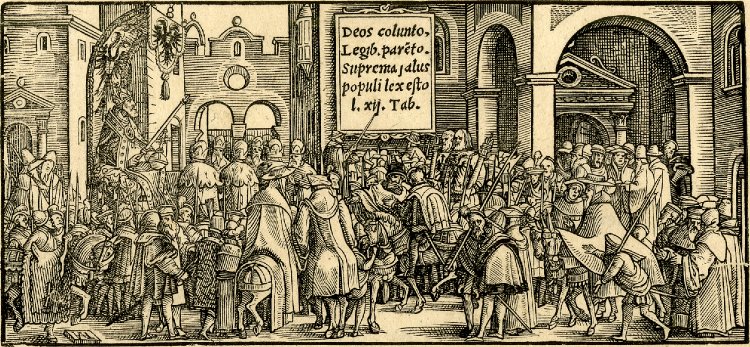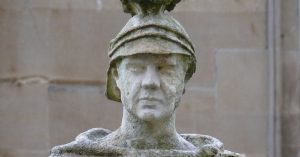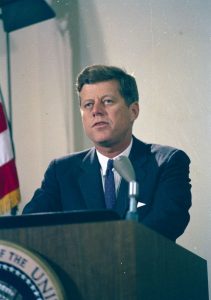In 1517, when the 95 Theses were first posted, Martin Luther had no intention of breaking from the Roman Catholic Church. Rather, he sought to reform the Church’s view on indulgences, believing that no one could buy their way into heaven. Believing that his view was deeply rooted in Scripture, he was confident that Church scholars would agree with him. Instead, the Church hierarchy responded by accusing Luther of heresy, wanting to quell any question of their authority. As a result, what was initially an effort to reform the Catholic faith eventually transformed into a major schism in Christianity itself.

Prior to sparking the Protestant movement, Martin Luther was an Augustinian monk teaching at the University of Wittenberg in Germany. In 1517, Pope Leo X sanctioned indulgences to be sold to raise money for the construction of St. Peter’s Basilica in Rome. An indulgence consisted of money given to the Church in exchange for less time in purgatory, which was conceived as a theological waiting room where imperfect souls were purified after death before they enter heaven. People essentially believed that this meant they could buy a way into heaven for themselves and their loved ones.1 As a result of the Pope’s decree, a Dominican monk, Johann Tetzel, began preaching in favor of these indulgences in the towns of Jüterbog and Zerbst near the university.2 Luther responded to this by writing to the archbishop, admonishing him by asserting that simply paying money to the Church does not purify the soul.
When his protestations went unanswered, Luther posted his 95 Theses. The theses were arguments opposing the manner in which indulgences were being sold.3 Most of the theses did not contradict Catholic doctrine, so it is widely believed that Luther wrote them to spark a theological academic debate. The theses, originally written in Latin, were translated into German and put into wide circulation; this caught the attention of Rome. Fearing that the funding for St. Peter’s Basilica was under threat, Leo ordered Luther to be investigated. In response, Luther sought the support of a Germanic prince, Frederick the Wise. Frederick granted Luther support and protection, insisting that the investigation take place in Germany.4 In response, Leo asked the papal legate in Augsburg, Cardinal Cajetan, to investigate Luther. Brought before Cajetan, Luther was asked to renounce his theses and recant his accusations against the Church. Luther refused, but agreed to stop commenting on indulgences and listen to the Church. Although this was not Cajetan’s desired result, Frederick allowed Luther to return to Wittenberg.5

The following year, 1519, Luther agreed to debate the theologian Johann Eck. Eck instigated the debate by comparing Luther’s positions to Jan Hus, a well-known heretic that had been excommunicated and executed a hundred years earlier. This forced Luther to declare that the Church had been wrong to condemn Hus, opening himself to charges of heresy.6 Eck had given the pope the opportunity to bring excommunication charges against Luther. However, the Holy Roman Emperor Charles V, not wanting to upset Frederick the Wise, forced the pope to subject Luther to a hearing at the Diet of Worms. At this time, Luther’s cause was gaining popularity among Germans. The emperor could not afford to upset the German prince, needing his support to fight an ongoing war with France and keep the Ottoman Empire from Austrian lands.7
During the trial, Luther was led into a room where his accusers had piled his works on a table, read the titles aloud, and asked if these books belonged to Luther. Luther replied that the books belonged to him. He was then asked to renounce them. Luther then asked for time to consider. When he returned the next day he refused to reject anything, saying that unless he was disproved by Scripture, he was bound by his conscience to defend his work.8 He felt that he was strongly supported by the Bible. However, Church officials saw this as a rejection of their authority rather than an appeal to Scripture. Charles V, though angered, could do nothing to condemn Luther as long as he remained at war. Instead, he planned to send Luther back to Wittenberg marked as a heretic.9 However, before he reached the university, Frederick the Wise secretly had Luther taken to Wartburg Castle.10
Throughout the next few years, Luther continued to defend his works. One of his biggest achievement during this time was the translation of the Bible from Latin into German. Still, he was forced to remain hidden. Charles V, after securing an alliance with the pope in the war against France, no longer needed ties with Frederick the Wise. This allowed the papal bull, proclaiming Luther’s excommunication, to be issued, adding a decree which ordered that no one give Luther refuge.11 It was ultimately his refusal to retract his works that prevented Luther from reforming the Church. Pope Leo X, Charles V, and other high Church officials perceived Luther’s passion for reform as a challenge to authority. In contrast, Luther believed that his works were strongly supported in Scripture. The miscommunication and stubbornness of both parties ultimately led to a major schism within Christianity. When the Church labeled him a heretic, Luther had no choice but to begin his own branch of Christianity, Lutheranism, so that he could continue to practice the faith to which he had dedicated his life.
- Renaissance and Reformation Reference Library, July 2002, s.v. “Martin Luther: Founder of Lutheranism” edited by Julie L. Carnegie. ↵
- New Catholic Encyclopedia, September 2003, s.v. “Luther, Martin” by Bill Ditewig. ↵
- Funk and Wagnalls New World Encyclopedia, 2016, s.v. “Luther, Martin” ↵
- Renaissance and Reformation Reference Library, July 2002, s.v. “Martin Luther: Founder of Lutheranism” edited by Julie L. Carnegie. ↵
- New Catholic Encyclopedia, September 2003, s.v. “Luther, Martin” by Bill Ditewig. ↵
- Renaissance and Reformation Reference Library, July 2002, s.v. “Martin Luther: Founder of Lutheranism” edited by Julie L. Carnegie. ↵
- Renaissance and Reformation Reference Library, July 2002, s.v. “Martin Luther: Founder of Lutheranism” edited by Julie L. Carnegie. ↵
- Encyclopedia of World Biography, December 2004, s.v. “Martin Luther,” by Andrea Henderson. ↵
- Julius Koestlin, Life of Luther (Project Gutenberg Literary Archive Foundation, 2006), 105-116. ↵
- Funk and Wagnalls New World Encyclopedia, 2016, s.v. “Luther, Martin” ↵
- Julius Koestlin, Life of Luther (Project Gutenberg Literary Archive Foundation, 2006), 105-116. ↵



94 comments
Kimberly Parker
When I first saw the title, I thought that the article was going to be about Martin Luther King, because that was the only one I’d ever heard of, appeared from MLK Jr. But reading this article about this man who rose up against the Church, and calling them out on what they were doing. It wasn’t like he was breaking away from the Roman Catholic Church, he was just trying to get them back on the right path. Because of this, he was investigated and then, later on, was put on trial to be judged. What he did was admirable, how strongly he believed in things, so much so, that he branched out and started his own religion.
Patricia Arechiga
I find this article pretty fascinating. I never really knew much about Martin Luther prior to reading this as we had briefly covered him in high school. I think its pretty interesting how passionate Martin was with his documentations and how he firmly defended them at the end of the day. After all, all he was doing was speaking his truth and beliefs out. I find it pretty ironic how it was the church that was committing the morally wrong actions and still tried to shut and bring Martin down. However, at the end of the day, Martin did eventually branch out and start his own ‘religion’ which was what the church was probably trying to stop.
Edith Santos Sevilla
Martin Luther has a long and interesting story based on the years that he started opposing the catholic church. I had read a little background of Martin Luther before reading the article, but overall this article describes in detail the story and how the decisions made by the church influenced his decisions. What I really liked about the article is that Luther followed his beliefs, and even after being opposed by the pope and the whole Catholic church, he was able to still practice his beliefs which followed the bible. One of the facts that surprised me that I didn’t know was that Luther translated the bible from Latin to German, which facilitated the spread of Christianity. Throughout the article the different resources and people that supported and opposed Martin Luther are explained. It is really sad that the church was the one the wasn’t following the beliefs and was taking bribes in exchange for indulgences. The story of Martin Luther as stated by the author can be controversial, and based on the article the different reason’s why are explained.
Cameron Lopez
MLK being accused for trying to fix the church shows how easily anything in this world is corrupt. Even a church. We all know he tried to do good in the name of the lord and was punished for it, he was treated unfairly and horribly. But even after all that he still continued to practice his faith which in the end created a new form of Christianity. The article make it clear that he did not want to break away from the church at all costs, which to me means that he loved the church and God so much that even after the church punished him he still was trying to do good in faith shows what he really was about.
Sharriah Martinez
it was refreshing to read about Martin Luther after just reading about the man and learning about him through power point presentation in class the other day. I thought it was interesting to know that Martin Luther wanted to still be a part of the church. I thought that his writing and thesis was to make people lose the church. Martin Luther voiced his opinion. This was a great read I feel like I understand who he was more now.
Michael Leary
Very tragic to hear about how the somewhat “innocent” protest of an educated religious lead to the second major schism in the Church. In one way, the objections brought up by Luther were legitimate problems, but, were eventually resolved in the Counter-Reformation starting in the 1500s. Very sad how an act seen as a revolt against authority lead to the eventual division of Christianity and has since caused many conflicts and suffering since then.
Christopher Hohman
Nice article. Luther’s original intention was merely to spark a conversation between members of the same faith. But it became so much more. The Catholic Church was not willing to have a conversation, they did not want anyone to challenge their authority, and were pretty quick to denounce Luther. It must have hurt him that the church he devoted his life to turned its back on them. He created his own faith because he had to. And because he did he created a schism in Christianity itself.
Christopher Metta Bexar
The article opened up many interesting points to a non Catholic, or non-Lutheran churchgoer. The discussion of indulgences was illustrative, as well as central to why Luther felt the church needed to reform.
Historically it was interesting that the Pope allowed Luther to take sanctuary with a German prince until he felt safe from the French. At which time Luther took sanctuary in Germany because a vast part of the country had left Catholicism.
Danielle Slaughter
Fantastic article! It wasn’t necessarily Luther’s refusal to recant his theses that prevented Catholic reformation, as the Church at the time was highly invested in retaining their authority and money. Of course, one has to wonder if Luther actually presented any Scripture-based evidence for his position, and if he even gave the Church a chance to give their reasons on the matter. Overall, it was both a turbulent and enlightening time in history, and you portrayed it well!
Alexander Manibusan
That was extremely wrong for the church to not just charge people “to go to heaven” but also to be cruel towards Martin Luther. What he did was just and was true since the Catholic Church wasn’t doing what it was supposed to do. Rather, it dishonored Christianity and advertised heaven to people, which goes against what is written in scripture. Although he would later have a challenging life with the church, Martin Luther did the right thing: telling the truth.